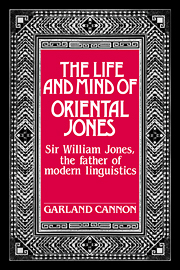Book contents
- Frontmatter
- Contents
- Preface
- Introduction
- Chronology of Jones's Life
- 1 A Barbaric Oriental Conqueror (to 1770)
- 2 Delicate Arab Maidens and Liquid Ruby (1770–1772)
- 3 Persian Jones and Constitutional Law (1772–1777)
- 4 The Athenian and Eleutherion (1778–1780)
- 5 An Ass Laden with Gold (1780)
- 6 Politics: Writings and Activism (1780–1782)
- 7 James River Property (1782–1783)
- 8 A Vision in the Indian Ocean (1783–1785)
- 9 A Sacred Oriental Language (1785)
- 10 A Genetic Explanation: Indo-European (1786–1787)
- 11 Sanskrit Literary Treasures (1787–1788)
- 12 An Indian Renaissance (1789)
- 13 A Burning Tropical Sun (1790–1791)
- 14 Scholar-Martyr (1791–1794)
- 15 Jones Today
- Appendix Five New Letters by Jones
- Notes
- Selected Bibliography
- Index
13 - A Burning Tropical Sun (1790–1791)
Published online by Cambridge University Press: 11 September 2009
- Frontmatter
- Contents
- Preface
- Introduction
- Chronology of Jones's Life
- 1 A Barbaric Oriental Conqueror (to 1770)
- 2 Delicate Arab Maidens and Liquid Ruby (1770–1772)
- 3 Persian Jones and Constitutional Law (1772–1777)
- 4 The Athenian and Eleutherion (1778–1780)
- 5 An Ass Laden with Gold (1780)
- 6 Politics: Writings and Activism (1780–1782)
- 7 James River Property (1782–1783)
- 8 A Vision in the Indian Ocean (1783–1785)
- 9 A Sacred Oriental Language (1785)
- 10 A Genetic Explanation: Indo-European (1786–1787)
- 11 Sanskrit Literary Treasures (1787–1788)
- 12 An Indian Renaissance (1789)
- 13 A Burning Tropical Sun (1790–1791)
- 14 Scholar-Martyr (1791–1794)
- 15 Jones Today
- Appendix Five New Letters by Jones
- Notes
- Selected Bibliography
- Index
Summary
Besides concentrating on his two Oriental law translations in his leisure, Jones spent much time in 1790 on matters related to his Society. Richard Johnson was leaving India because of poor health. Jones hosted a farewell party at the first of the year, at which he recommended Johnson to Banks as “one of the most distinguished of the Company's servants in India for ability as a public man, & for knowledge of various kinds & agreeable manners” (2:854).
Shore's departure interrupted another friendship. After completing the decennial revenue settlements (in which Jones assisted), he also left because of poor health. As he later said of Jones: “At the Gardens, he was my neighbour…. I have often regretted, as I flatter myself he also did, that our different avocations prevented our meeting as constantly as we both wished.”
Jonathan Duncan, another charter member of the Society and now superintendent at Benares, was helping resolve the revenue problem. He sent Jones a manuscript of the rare Nāradasmriti, a part of the “divine law” in the Smṛitis usually considered a supplement to the Mānava-Dharmaśāstra. As Cornwallis had told Jones of Duncan's treaty with the Infanticides, Jones hoped that it would be “the means of preserving the lives of thousands.” He equally condemned thuggee, “the sordid priestcraft of Durgā's ministers” (2:855, 856). These were cultural conditions that, in his view, could conceivably be cooperatively eliminated without trampling on Indian customs.
- Type
- Chapter
- Information
- The Life and Mind of Oriental JonesSir William Jones, the Father of Modern Linguistics, pp. 316 - 336Publisher: Cambridge University PressPrint publication year: 1991



